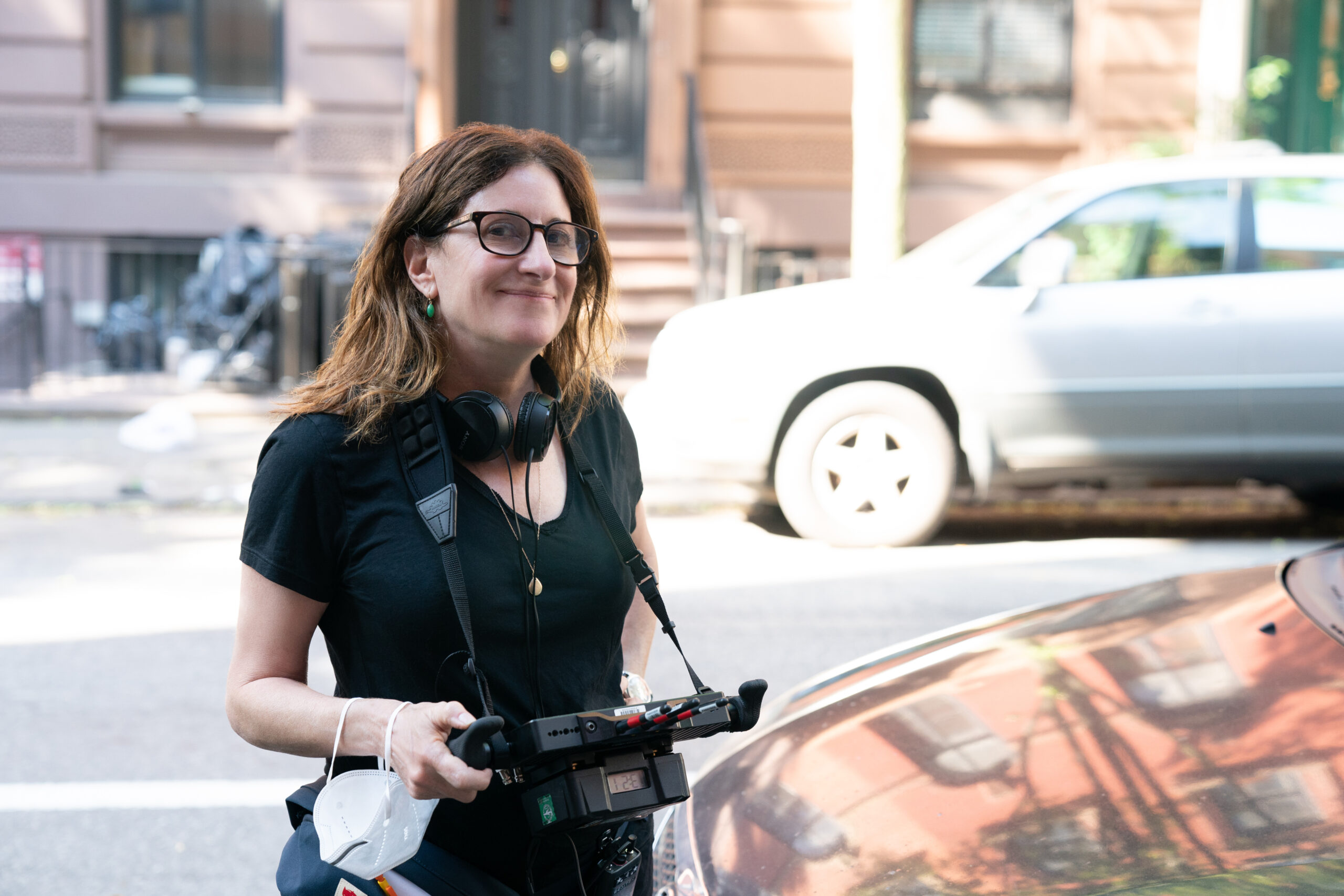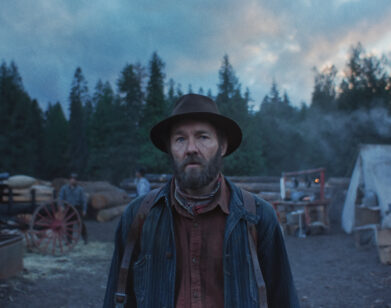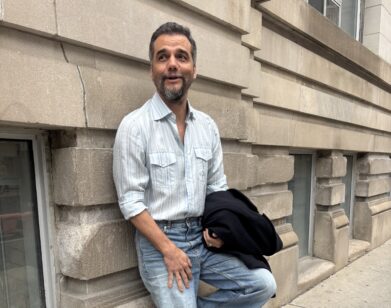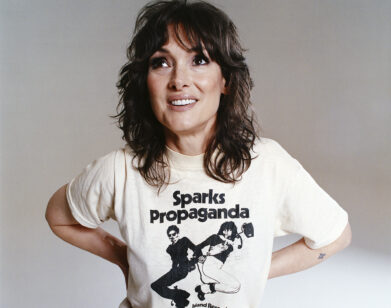IN CONVERSATION
Nicole Holofcener and Nick Kroll on Making Art and Eating Ass
In the excellent films of the director Nicole Holofcener, people say the blunt, caustic things they might suppress in real life, or otherwise find themselves negotiating the unspeakable, tiptoeing around each other as loved ones must often do. The 63-year-old director of Friends With Money, Enough Said, and Please Give is one of our foremost scribes of domestic upset, her writing the perfect vehicle for hilarious, thorny, and raw performances by the esteemed actors in the Holofcener Troupe, which includes regulars like Catherine Keener, Connie Britton, and Jennifer Aniston. In her latest film, You Hurt My Feelings, she reunites with Julia Louis-Dreyfus, who previously starred opposite James Gandolfini in Enough Said, Holofcener’s quietly moving and criminally underrated 2013 sorta rom-com. It comes as little surprise that the writer-director herself is as plain-spoken as the characters she brings to life; just a few minutes into her Zoom call with the equally frank Nick Kroll, the two were talking about fecal matter. Shortly before the theatrical release of You Hurt My Feelings, in which boasts Louis-Dreyfus plays a novelist whose husband secretly dislikes her latest book, Holofcener and Kroll bonded over parenthood, their sensitivity to the sound of people chewing, turning suffering into art, and imposter syndrome.
———
NICK KROLL: Well, well, well.
NICOLE HOLOFCENER: I’m so sorry for making you do this.
KROLL: It’s my pleasure. It’s my honor. I don’t know if I’ve ever done one of these over Zoom. Nicole, here’s my request to you in this interview, that we both turn off our self view. So if anything is unseemly or unsightly, we pledge that we’ll say honestly and openly what’s wrong with each other.
HOLOFCENER: You mean our physical appearance?
KROLL: Physical appearance, weird things in our teeth, bizarre things in the background.
HOLOFCENER: Deal.
KROLL: And I guess this is a decent way to talk about your new film [You Hurt My Feelings], which I think at its heart deals with that constantly. How honest can we be with our loved ones? How do we manage to both show them love and support and also be honest and critiquing of them in their work and their life?
HOLOFCENER: So you watched the movie last night?
KROLL: I watched it about 15 minutes ago.
HOLOFCENER: I’m so glad you did so much homework.
KROLL: I watched the entire movie. I don’t even do that for jobs.
HOLOFCENER: Okay, good. You’re just the best, and I’m loving everything you’re doing. History of the World, Part II is just, you’ve made me pee in my pants. And I watched your stand-up again and I just love how much you talk about shitting. I mean, it’s just so refreshing.
KROLL: It’s unfortunately top of mind.
HOLOFCENER: I know. And you can stand on a stage and let everybody in the audience picture your asshole and shit coming out of it.
KROLL: Well, I’ve never put it quite so graphically…
HOLOFCENER: Sorry, but it’s true. And it just speaks to me, because I always just want to say what nobody else will say. And you do that and not everybody can get away with it, but people as funny as yourself can. And I’m very grateful for it.
KROLL: Thank you for saying that. And because this is a conversation, I will now direct it back to you, and how I think in various ways, while maybe not directly talking about shitting your pants, you so successfully and adroitly talk about the emotional nature of shitting one’s pants, inside of friendships and relationships. Which I would argue is more revealing and intimate. I have to just ask: how do you decide what gets shared?
HOLOFCENER: Well, I have one friend who says, “You can’t write anything about me and my marriage.” And that’s because it’s a very tender subject in her life. So I obey. I’ve taken things from people without asking, but to me they seem kind of harmless. For instance, my friend’s husband has consistently given her leaf earrings for every birthday. And I just thought, “This is so funny, I’m going to put it in here.” And I didn’t ask her. And she had no idea when she saw the movie what a large plot point it would be. And her husband came to see the movie last night, and he had a sense of humor, I hope. He seemed fine with it.
KROLL: And do you find that people are flattered by it?
HOLOFCENER: Yeah, I think so. If I’m doing little idiosyncratic things like that, I think sometimes they are, but I’ve tread a fine line. I think I’ve made some friends uncomfortable and I don’t feel that good about it and I don’t plan on doing it again. I like my friends too much.
KROLL: But I mean, the observation monster inside of you can’t help it, especially when it’s something so clean like the leaf earrings.
HOLOFCENER: Right.
KROLL: My wife is a landscape designer and botanical artist. And so it almost was triggering because it’s easy to get her gifts. “Oh, I’ll just get her something with flowers or plants on it.” And I’m going, “Oh fuck, am I getting the leaf earrings? Am I doing that over and over?”
HOLOFCENER: Yes. Maybe.
KROLL: But I think that’s good. That means what you’re doing makes sense. And I think that’s so consistent in your work. The details inside all of your films are so weirdly intimate and specific. And inside of that specificity is the universal-ness that I think people are so affected by.
HOLOFCENER: I wish that I could mine more from my friends’ crazy lives without hurting their feelings. It’s just so entertaining, other people.
KROLL: What about with your kids? The relationship with Julia’s son in this movie is so specific. And I have a two-year-old now, but I’m still the son to my mother, and I can relate so much to the dynamic that you have in play there.
HOLOFCENER: It’s tricky. I have twins, and I’d like to write more about them, but I don’t want it to get messy. I don’t want them to feel bad or exposed. I think that this character, while he resembles my sons for sure, especially one of them because he wants to be a writer, but I kind of make up the problem. I don’t think this particular issue that this son has in the movie is one that my kids have–the overpraising. But I’ve certainly fucked them up in many other ways and made plenty of mistakes. Somehow, I thought I could escape it because I’m smart and loving, and my kids are the most important things to me in my life. “How could I go wrong?” So you be careful there, Nick.
KROLL: No, trust me, I’m two-and-a-half years in and I was furious at him for spitting up coconut on the floor today. And I’m just like, “What am I doing?”
HOLOFCENER: I’m calling Child Services. You were furious?
KROLL: Well, what I tried today, because he’s just learned the word angry, I said, “Daddy’s angry.” And I could see him sort of processing that for the first time. Do you get angry with people? Like, openly angry?
HOLOFCENER: Well, it’s pretty easy to be openly angry with my mother. That is a given. And my sister.
KROLL: Do you pull lines from your mom?
HOLOFCENER: I take bits and pieces for humor’s sake. My mom has said to me things like, “Well, they didn’t do good advertising your film and you need a new agent.” Or, “You need to find a better distributor.” And I’ve said numerous times, “How does this help me? This just makes me feel bad.” And I know she’s doing it with love, she wants me to be appreciated and represented in the best way possible.
KROLL: But even when you know that it’s coming from a place of love, it’s so hard to ingest, I’ve found.
HOLOFCENER: Yeah. What’s your mom like with your fame and fortune? Your career?
KROLL: She’s incredibly proud of me and has always been very supportive of me. And she’s gotten better and better about being like, “Can I offer you a piece of advice? Can I offer you a critique?” So she’s gotten better in that way, which I appreciate. She’s really smart. Really, really smart.
HOLOFCENER: Yeah, my mom too.
KROLL: Back to your film. So, I feel like when you love someone, you want to show them love through either unmitigated support or criticism. Or not criticism, but just your knowledge. Your mom telling you to get a new distributor is not going to fix any of it. Nor is, “You’re perfect, and your films are perfect.” So what a great struggle life is…
HOLOFCENER: It’s a conundrum. But speaking of, my mom was a set decorator, a very successful one for a while. And she has really, really strong opinions about decorating and my clothes. And to this day, we still fight about it. She’ll come to my house and say, “Your couch is really long.” “Yes, mom, what does that mean for you?” “Well, yeah, the long coffee table in front of the couch just makes it look longer.”
KROLL: Can I ask one last question about the movie?
HOLOFCENER: You can talk as much as you want, but it’s just more interesting to talk to you.
KROLL: I just want to talk about the food in the movie. Julia’s eating almost throughout the film. Is that you? Is that her? What is that?
HOLOFCENER: I guess that’s me. But if you notice, the only thing Julia actually chomps on is the cookie.
KROLL: Yes.
HOLOFCENER: But yeah, the eating is a big thing, which is ironic because I can’t stand to hear people eat.
KROLL: Oh, I can’t either.
HOLOFCENER: I have misophonia. Do you, too?
KROLL: I’ve never been diagnosed as such, but I cannot stand the sound of it near me. Are your ears sensitive in general, or is this specific to food chewing?
HOLOFCENER: No, it’s gotten worse. My ears are sensitive. It used to be just chewing, and mostly people eating when I’m talking to them on the phon just makes my skin crawl. Now it’s become wrappers and people who crunch water bottles and how long it takes to open a potato chip bag. It’s like, “Just fucking open it. Just tear it open, get scissors.” It’s not pleasant to be around me when this is happening.
KROLL: Or, it’s not pleasant for those people. It’s their fault. It’s not your fault.
HOLOFCENER: No, they’re disgusting. They’re noisy and disgusting.
KROLL: So what’s it like for you to go to the movies?
HOLOFCENER: I mean, if somebody’s opening a candy wrapper forever, or even just eating popcorn right in front of me, it’s really hard. And I have to breathe and, quote, unquote, “breathe”.
KROLL: Have you taken a breathing class yet?
HOLOFCENER: No. Have you?
KROLL: No. I do meditation. I have an app called Breethe. I’m trying to cure what ails me so I write these scenes where people are eating. I mean, I think James Gandolfini ate his way through Enough Said. So I have to take out all these chewing sounds or kissing sounds. So, if you notice, nobody makes any noise when they’re eating or kissing. It’s silent.
KROLL: That’s so funny. That’s such self-torture to write all of this eating and then make yourself listen to it and then take it out.
HOLOFCENER: So much of the stuff I write is self-torture, because I’m writing about something I’m uncomfortable about and then I have to direct it.
KROLL: Reliving it over and over and over again. So you really have maintained a very similar team with the people you work with.
HOLOFCENER: Some of them, yeah.
KROLL: How do you do that? What’s the secret?
HOLOFCENER: Well, my producers I’ve been working with since the beginning. And they take real good care of me and I love them and they love me. So that’s been really consistent. And I’ve used several actors over and over again, just because it’s fun. But I like working with a DP, then that DP is not available. It’s really hard to hang on to people who are really talented, because for instance, this movie was Tier 1, which means the pay is really shitty. And people can make so much more money elsewhere.
KROLL: It’s hard to tell them, “You can’t go make more money doing this other thing.”
HOLOFCENER: And they might say, “I want to do it, but I have three kids and I got a TV show.” So I try to work with the same people that I love as much as I can.
KROLL: Did you ever hire your mom as a production designer?
HOLOFCENER: No. She’d be so good though, especially with New York, because she did all these Woody Allen movies and she knows what the radiators look like. She knows what the dust on the windowsill looks like. The soot, I should say.
KROLL: Will she comment on that element of your work?
HOLOFCENER: Yeah, I think so. She’s also really complementary and emotional and proud and weeps after my films. And as much as I fight back, I really want her to love my work. I want her approval, still. I want her to like my outfit. I want her to like my long couch. And it’s a burden for her, because it’s a lot of pressure. Just like my own kids, they want me to like everything they do and say, and I don’t always, and I guess that’s maybe just the nature of being a parent and having a parent.
KROLL: And do you tell them when you don’t like something that they’re doing?
HOLOFCENER: Usually it’s about their facial hair. I try to contain myself, but then there’s this porn mustache happening. I’ve gotten better. I’ll just say, “You look great.”
KROLL: That is funny. There is a Gen Z thing with young men, a mustache thing. It’s like this weird throwback. They’re not allowed to actually be sleazy anymore, so they have to have a mustache to be—
HOLOFCENER: To be Burt Reynolds.
KROLL: Yeah. They can’t be Burt Reynolds in life, but they can look like him.
HOLOFCENER: My kid actually keeps calling me.
KROLL: You’re not taking the call of your kid?
HOLOFCENER: No. Although if I told him I was on the phone with you, he’d probably be really excited. You’ve probably met him.
KROLL: I think I have met him.
HOLOFCENER: Yeah, Joe. I drag him around to a lot of places.
KROLL: I’ve met him. And you had twins, so that must have been so easy.
HOLOFCENER: It was. Piece of cake. I never got so much sleep in my life.
KROLL: Did they unify against you? Or was it divide and conquer?
HOLOFCENER: Divide and conquer, not unified. I mean, I’m sure sometimes they were, but they’re very different from one another, so it was not like having identical twins, who just love each other to death. It was more like two brothers with a lot of strong feelings about being twins.
KROLL: And you dress them the same, still?
HOLOFCENER: Yes. They insist. They have the same mustache. No, why would anybody do that to their twins? I mean, unless the twins really wanted to do that, but no. You have one, so it’s good.
KROLL: I have one. He does have a few pieces of clothing that I would be thrilled to own. And he’s much more attractive than I am. He’s better looking, I can tell already, and I’m psyched about that because it feels like an upgrade.
HOLOFCENER: Right. He might not suffer the same ills.
KROLL: But I also wonder, do you need some of those ills to create something? Do you need to suffer along the way a little bit if you want to create something beautiful?
HOLOFCENER: I think so. But also, if you’re any kind of deep feeling person, or a person who’s willing to go there, to really look at yourself and the world, then I don’t think you have to be miserable. I mean, I suffered as a kid. I was bullied. I had a really beautiful sister. I grew up with the pretty sister, where I’m 12 years old and my boyfriend comes over and my sister walks into the room and he says, “That’s your sister?”
KROLL: Crushing.
HOLOFCENER: Yeah. That never goes away. And I’m fine. I look okay.
KROLL: You look great.
HOLOFCENER: So do you. But that informed me completely. And so did the bullying, and so did my parents divorce, and every bit of suffering. And good stuff, right? I mean, with Big Mouth, it’s miraculous that you can make hilarity out of your tragedy.
KROLL: Yeah. I mean, thank god. I think I learned from that and in a way I’ve tried to reflect on it since then. And there’s the intimacy you have in a relationship, and then there’s the intimacy you have with your audience, and the desire to be vulnerable and specific. And I think what I learned in doing Big Mouth was trying to be more forthright with my work. And it’s scary because you’re rewarded for it, right? Because the audience can really connect with something real. But also, how revealing do you want to be? And what is not up for—
HOLOFCENER: Public consumption.
KROLL: Yeah.
HOLOFCENER: Not much, apparently. I’m pretty willing to expose myself. I think I have a desire to. Just like you like talking about shitting in your pants. I want to talk about that too. It’s like, “Hello, everybody. We’re all the same, and we’re all fools. And I’m not afraid to say that I am. Of course, I think you are, too.”
KROLL: That in and of itself makes you very much not a fool. It’s so weirdly brave to expose how cowardly you are.
HOLOFCENER: Right. That’s why I love your work so much. Aside from all of the characters that you’ve played. I’m pretty obsessed with The Kroll Show.
KROLL: It was called Kroll Show, which looking back was such a complicated name. It should have been The Kroll Show, or something. But I insisted on it being Kroll Show and no one ever could say it right.
HOLOFCENER: Why did you oppose The Kroll Show?
KROLL: I don’t know. Aesthetically, it wasn’t pleasing. Kroll Show felt, on a visual level, really clean. Just two words.
HOLOFCENER: I wish you’d make another Kroll Show.
KROLL: Oh, it’s exhausting.
HOLOFCENER: It was?
KROLL: It’s exhausting doing it. I think there’s certain things inside of that show that will hopefully live on in other ways, characters and things, and find new homes.
HOLOFCENER: Do you write screenplays?
KROLL: I’m so afraid of writing a bad screenplay on my own that I tend to find people to work with who I will break stories with. Very complete, very detailed, and then let them write the script. And I think it’s truly a fear of mine, going off and being like, “I’m going to go write a movie.” And to turn it in to someone to read is the scariest thought I could imagine.
HOLOFCENER: Really? Do you think you’re a bad writer?
KROLL: I think I’m scared to… I’m such a verbal writer. I really write in conversation. I have great insecurity about like, “I’m going to sit down on a computer and write this thing.” And then hand it to someone. I don’t know if my ego could handle that.
HOLOFCENER: I know. The only thing that gets me to do it is that I think, “Well, I’ve done this before, and people have said it’s good.” And so I try to override my insecurity, or my imposter syndrome. And I think, “Well, okay, it’s worked before. I know how to do this.”
KROLL: Empirical evidence.
HOLOFCENER: Right.
KROLL: Do you talk to people while you’re doing it?
HOLOFCENER: Sometimes. I don’t like talking about my work very much. But yeah, I’ll say, “I’m stuck here” or, “I’m not sure where to go here.” If I’m in the middle of a script and I’m really lost, I’ll give it to a couple of people and say, “What should I do?” Usually, if I’m doing that, the script is not very good, and usually the response confirms it. Like, “Great first act.” First acts are pretty easy, I think. And I end up trashing it and writing something else and not giving it to anybody until it’s finished. But it’s always scary.
KROLL: Are you able to differentiate between the really negative voices in your head that have pushed you to be really good at what you do and the destructive version of those voices?
HOLOFCENER: I guess if I’m answering your question right, I’m always battling the negative voices in the head. And you just wouldn’t get out of bed if you gave into them. So right now, my friends are texting me. And apparently I’m always available to them, because right now they’re like, “Where are you? Why aren’t you answering me?” And I just want to take a picture of you and say, “Leave me alone.”
KROLL: And they’ll be like, “Who is that vagrant?”
HOLOFCENER: Exactly. This is kind of funny, actually. “What are you doing? Are you eating from a shrimp buffet?”
KROLL: That sounds like a dream. I’m allergic to shrimp. I’ve become allergic to fish. All I want to do is eat shrimp cocktail. I’ll just turn bright red.
HOLOFCENER: Did you see that episode of Broad City?
KROLL: No.
HOLOFCENER: Oh my god. Ilana is allergic to lobster, but she’s determined to have a lobster dinner. And she’s convinced she knows her cutoff. Like, “I can eat this much lobster and stay alive.” And she can’t stop, and her face blows up. It’s brilliant.
KROLL: I heard about a couple who had a date and they went and had a fancy dinner. They go home. They’re hooking up. The guy goes down on the woman, and then proceeds to eat her ass, if I’m just going to go all the way. And his face starts to swell, his lips start to swell. He starts to have an allergic reaction to something and they don’t know what it is. And then he’s like, “Wait, what did you have for dinner?” And she’s like, “I had lobster,” and he has a shellfish allergy.
HOLOFCENER: You’re joking. No way.
KROLL: No, this is the story that I heard. And he had eaten her ass after she had pooped out her lobster, and he had an allergic reaction.
HOLOFCENER: And died. Wow. That is intimacy, isn’t it?
KROLL: The risks of intimacy. I can’t believe I’m going to do this, but I think I have to cut off the conversation. I have therapy, like right now.
HOLOFCENER: Oh, I thought this was therapy.
KROLL: I’m going to talk about this in therapy.
HOLOFCENER: Thanks for doing this.
KROLL: Thank you for thinking of me. You’re one of my favorite filmmakers and artists, and so the idea that you would ask me to do this is really high praise, so I appreciate it.
HOLOFCENER: Nick, I feel the same way.







